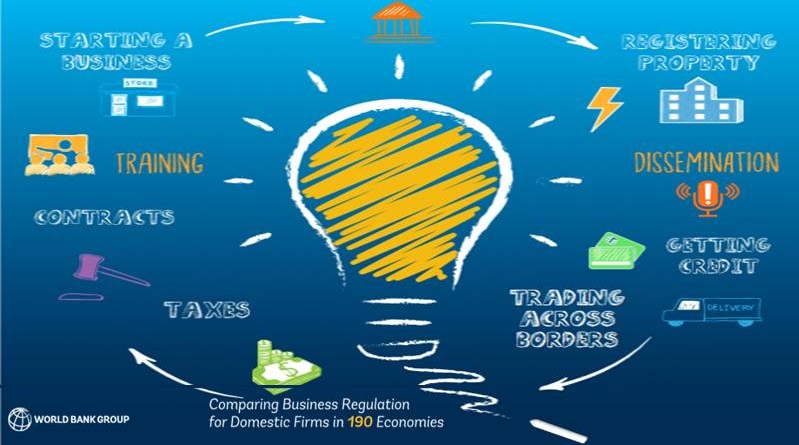Nigeria slipped one place behind to rank 146 out of 190 countries on the World Bank Ease of Doing Business Report for 2019. Nigeria ranks behind Mali (145), Tanzania(144), Niger (143), Senegal (141), Togo(137), Mozambique (135), Cape Verde (131), Uganda (127), Cote D Voire (122), Egypt (120), Ghana (114), Malawi (111), Namibia (107), Lesotho (106), Djibouti (99), Zambia (87), Botswana (86), South Africa (82), Tunisia (80), Kenya (61), Morrocco (60) and Rwanda (29) on the African Continent. Rwanda at 29 on the list is the highest ranking African Country on the Ease of Doing Business 2019.
Last year Nigeria had ranked No. 145 on the list.
Below is how Nigeria fared across the key areas for measuring the Ease of Doing Business;
- Starting A Business – 120
- Dealing With Construction Permits – 149
- Getting Electricity – 171
- Registering Property – 184
- Getting Credit – 12
- Protecting Minority Investors – 38
- Paying Taxes – 157
- Trading Across Borders – 182
- Enforcing Contracts – 92
- Resolving Insolvency – 149
- Labour Market Regulation – N/A
The 2019 World Bank 2019 Ease of Doing Business Report captured 314 reforms in 128 economies across the globe between June 2, 2017 and May 1, 2018.
These reforms are tracked – and inspired – by the World Bank Group’s Doing Business Index ranking 190 countries on the ease of doing business within their borders.
This year’s results clearly demonstrate government commitment in many economies, large and small, to nurture entrepreneurship and private enterprise,” said Rita Ramalho, Senior Manager of the World Bank’s Global Indicators Group, which produces the report.
Sub-Saharan Africa has been the region with the highest number of reforms each year since 2012. This year, Doing Business captured a record 107 reforms across 40 economies in Sub-Saharan Africa, and the region’s private sector is feeling the impact of these improvements. The average time and cost to register a business, for example, has declined from 59 days and 192% of income per capita in 2006 to 23 days and 40% of income per capita today.
Furthermore, the average paid-in minimum capital has fallen from 212% of income per capita to 11% of income per capita in the same period. This year’s 10 top improvers include a range of economies—large and small; rich and poor from five regions. The diversity shows that, regardless of background, any economy can improve business regulation when the will of policy makers is strong. With 13 reforms between them, China and India—two of the world’s largest economies—are among the 10 top improvers.
At the same time time Djibouti, a small economy, is also on the list with six reforms. And with a
total of 12 business regulatory reforms between them, Afghanistan and Turkey are on the list of 10 top improvers for the first time in the report’s history. Perhaps most notably, four of the 10 top improvers—Afghanistan, Djibouti, Côte d’Ivoire and Togo—are countries suffering from fragility, conflict and violence. The World Bank Group and other organizations have worked closely with these economies to address pressing humanitarian and developmental needs, while also strengthening their legal and economic institutions.
12 takeaways from the 2019 ease of doing business index
1. Between June 2, 2017, and May 1 this year, 128 governments introduced a record 314 reforms benefitting small and medium business and entrepreneurs, enabling job creation, and stimulating private investment.
2. Four of the 10 top improvers in the ease of doing business index — Afghanistan, Djibouti, Cote d’Ivoire and Togo — are countries suffering from fragility, conflict and violence.
3. One-third of all business regulatory reforms were in the economies of Sub-Saharan Africa — a total of 107 reforms and a record for the region.
4. Two countries from Eastern Europe and Central Asia made the top 10 in the ease of doing business index: FYR Macedonia in 10th and Georgia, edging up two spots to 6th.
5. Brazil recorded the largest score improvement in Latin America and the Caribbean, reforming in four areas.
6. United Arab Emirates entered the top 20 in 11th place at the ease of doing business index.
7. China, one of this year’s top 10 improvers, advanced more than 30 spots to 46th place in the global rankings.
8. India became South Asia’s top-ranked economy, advancing 23 spots to 77th place in the ease of doing business ranking.
9. Georgia — an early adopter of Doing Business and the second biggest reformer (after Rwanda) — has cut the amount of time to start a business to 2 days.
10. The BRIC economies — Brazil, the Russian Federation, India and China — introduced a total of 21 reforms, with getting electricity and trading across borders the most common areas of improvement in the ease of doing business index.
11. A casual relationship has been established between electricity consumption and economic growth in India, Indonesia, the Philippines and Thailand.
12. Research on electricity provision in India shows that the expansion of the electricity network boosts industrial development and increases the performance of smaller firms.
Top 10 Countries in the World Bank 2019 Doing Business Report
From the World Bank Ease of Doing Business Report, the top performing economies exemplifying ease of doing business in 2017/18 include; New Zealand (Star Performer) (No. 1.), Singapore (No. 2.), Denmark(No. 3.), Hong Kong(No. 4.), South Korea (No. 5.), Georgia (No. 6.), Norway (No. 7.), United States (No. 8.), United Kingdom(No. 9.) and Macedonia(No. 10.)
The Top 10 improving economies in the report according to the World Bank include; Afghanistan (No. 1.), Djibouti (No. 2.), China (No. 3.), Arzebaijan (No. 4.), India (No. 5.), Togo (No. 6.), Kenya (No. 7.), Cotedvoire (No. 8.), Turkey (No. 9.) and Rwanda(No. 10.)




